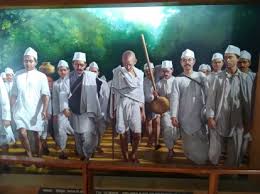
August Kranti Day, observed annually on August 9, is a significant date in Indian history that commemorates the Quit India Movement, a pivotal event in India’s struggle for independence from British colonial rule. This day marks the anniversary of the launch of the Quit India Movement in 1942, which played a crucial role in the country’s journey to freedom. Here’s an in-depth look at August Kranti Day 2024, including its history, significance, and related details.
Table of Contents
Date of Observance
August Kranti Day is observed on August 9 each year. The date marks the anniversary of the day in 1942 when the Quit India Movement was officially launched by Mahatma Gandhi and the Indian National Congress.
History Behind the Quit India Movement
The Quit India Movement, also known as the August Revolution, was a major turning point in India’s struggle for independence. It was initiated by the Indian National Congress, led by Mahatma Gandhi, on August 9, 1942, during World War II. The movement was a response to the British government’s refusal to grant India full independence and its failure to meet Indian demands for self-rule.
Context Leading to the Movement
- World War II Impact: The outbreak of World War II had a profound impact on India. The British government, embroiled in the war, did not consult Indian leaders before involving India in the conflict. This led to widespread dissatisfaction among Indians who were demanding full independence.
- Cripps Mission: In 1942, British Prime Minister Winston Churchill sent Stafford Cripps to negotiate with Indian leaders and address their demands. The Cripps Mission proposed limited self-government for India after the war, but it fell short of Indian leaders’ demands for immediate independence. The proposal was seen as inadequate and was rejected by the Congress.
- Demand for Immediate Independence: The failure of the Cripps Mission intensified demands for immediate independence. The Indian National Congress, under Gandhi’s leadership, called for the British to “Quit India” and end colonial rule. This call was made through the resolution passed at the All India Congress Committee session in Bombay on August 8, 1942, which led to the launch of the Quit India Movement on August 9.
The Movement
The Quit India Movement was characterized by widespread protests, demonstrations, and civil disobedience across India. Key features of the movement included:
- Mass Protests: The movement saw mass protests, strikes, and demonstrations across the country. People from various walks of life, including students, workers, and leaders, actively participated in the struggle.
- Repression and Arrests: The British government responded with severe repression. Leaders of the Indian National Congress, including Mahatma Gandhi, Jawaharlal Nehru, and other prominent figures, were arrested. The British authorities imposed curfews, banned public meetings, and used force to suppress the movement.
- Non-Violent Resistance: Despite the widespread protests, the Quit India Movement was largely non-violent, consistent with Gandhi’s principles of non-violence (Ahimsa). However, some incidents of violence did occur due to the brutal response of the British authorities.
- Impact on Independence: Although the Quit India Movement did not achieve immediate independence, it significantly increased political pressure on the British government. The movement highlighted the unity and determination of the Indian people in their quest for freedom.
Significance of August Kranti Day
- Commemoration of Struggle: August Kranti Day serves as a reminder of the sacrifices made by countless individuals during the Quit India Movement. It commemorates their courage and determination in the fight for independence.
- Recognition of Leadership: The day honors the leadership of Mahatma Gandhi and other prominent leaders of the Indian National Congress who played a crucial role in mobilizing the masses and advocating for India’s independence.
- Symbol of Unity: The Quit India Movement symbolizes the unity of the Indian people in their struggle against colonial rule. It serves as an example of how collective action and perseverance can lead to significant political and social change.
- Educational Purpose: Observing August Kranti Day provides an opportunity for education and reflection on the history of India’s independence struggle. It helps younger generations understand the significance of the movement and the importance of freedom and democracy.
Celebrations and Observances
August Kranti Day is observed through various commemorative activities and events:
- Ceremonial Events: Government institutions, educational organizations, and public places often hold ceremonies to commemorate August Kranti Day. These events may include speeches, flag hoisting, and tributes to the leaders of the Quit India Movement.
- Educational Programs: Schools, colleges, and universities may organize educational programs, debates, and discussions on the Quit India Movement and its impact on India’s independence.
- Media Coverage: The media often covers the significance of August Kranti Day, highlighting historical events and the contributions of leaders involved in the movement.
- Public Gatherings: Public gatherings and exhibitions may be organized to showcase historical documents, photographs, and artifacts related to the Quit India Movement.
August Kranti Day 2024: Reflections and Observations
In 2024, August Kranti Day continues to hold significance as India reflects on its history and the enduring legacy of the Quit India Movement. The observance serves as a reminder of the struggles faced by the nation in its quest for freedom and the ongoing importance of preserving democratic values and national unity.
Conclusion: The Legacy of August Kranti Day
August Kranti Day is a poignant reminder of India’s struggle for independence and the pivotal role of the Quit India Movement in shaping the country’s destiny. The day honors the sacrifices and contributions of those who fought for freedom and underscores the importance of remembering and learning from the past.
As India observes August Kranti Day 2024, the reflections on the Quit India Movement serve to inspire a renewed commitment to the values of freedom, democracy, and national unity. The legacy of the Quit India Movement continues to be an integral part of India’s historical consciousness and national identity, reminding current and future generations of the power of collective action in achieving significant social and political change.








